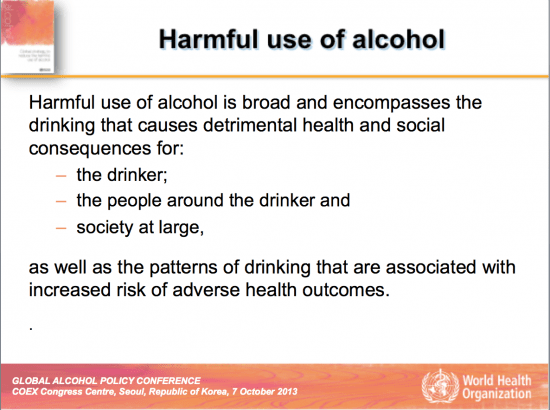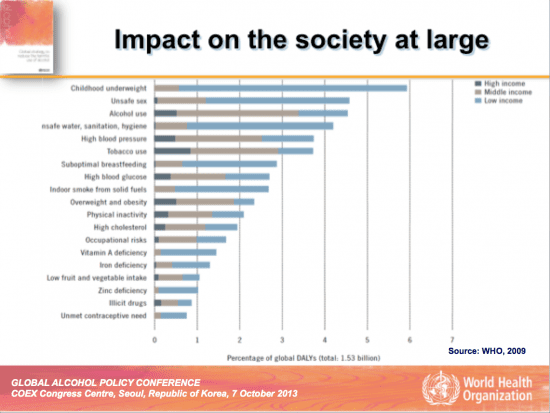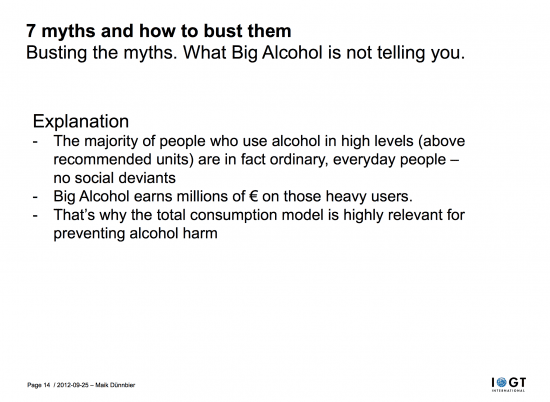The other day I came across a news article (in the industry outlet “Just Drinks”) and subsequently an opinion piece by the CEO of beer brewer Heineken, Mr. Jean-François van Boxmeer. The news was that he had urged public health advocates and decision-makers to drop their “mistrust” of the global alcohol industry.
So, I asked myself: Should I start trusting Big Alcohol?
In IOGT we embrace evidence and we like to take a sober look at reality. Therefore, I am now putting Big Alcohol’s claims to the test – as they came to me through the article in the Hufffington Post where a big CEO of the global alcohol industry bemoaned the attitude of civil society groups and authorities. “We are meeting with opposition and mistrust with advertising authorities, health lobbies and regulators,” he wrote.
A number of high-profile UK health bodies quit the Government’s responsibility deal last year, after the coalition dropped its plans for a minimum unit price.
Apparently the whole endeavor of trusting Big Alcohol is off to a really bad start because despite claiming decision-makers wouldn’t trust Big Alcohol, all too often they entertain too close ties with Big Alcohol. Just take a look at three simple examples:
1) The British Medical Journal in the feature published on January 8, 2014 “Alcohol and Public Health. Under the influence” exposed that documents show the Department of Health alone had 130 meetings with the alcohol industry suggesting minimum pricing consultation was a sham. Thanks to the BMJ investigation we now know the “extraordinary level of access” granted by the government to the alcohol industry as it fought successfully last year to kill off a minimum unit pricing policy in England and Wales.
The Guardian, by the way, used the phrase “dancing to the tunes of the … industry” in a headline on the subject.
2) Did you know that there’s a EP Beer Club in the European Parliament? It has 80 members right now.
3) Not only in the European Parliament, but also in the European Commission do we have close ties between Big Alcohol and key decision-makers: Commissioner for Trade De Gucht owns a million Euro stake in a wine company and Despina Spanou, former Chair of the European Alcohol and Health Forum used to work for a big law firm, consulting for several alcohol producers. Those are only two examples.
And just to be sure: we’ve only looked at the United Kingdom and European Union so far. We know that around the world Big Alcohol works with all tools at their disposal to create and sustain close ties with politicians. Obviously one of the basic premises of the article of Mr. van Bozmeer is faulty.
Surely, those are good reasons for independent public health advocates in particular and civil society organisations, and citizens in general to be and remain sceptical of Big Alcohol and to continue to address the inherent conflict of interest and to protect democratic processes from corporate influence.
What else does Mr. van Bozmeer have to say?
He writes: “A significant focus of the debate on alcohol abuse revolves around the cost to individuals and society. For many, the answer is simple: limit advertising and marketing, restrict product availability and raise taxes. However, whilst some of these measures may impact the overall consumption in a market, they fail to have a significant impact on the issue they are intended to address: alcohol abuse.”
He describes what World Bank, World Economic Forum (not exactly known to be enemies of free markets and multinational corporations) as well as the World Health Organization have established as the three Best Buys to reduce and prevent alcohol harm.
So, how come the CEO of Heineken is at odds with what World Bank, World Economic Forum and WHO prescribe as the three best measures – most cost-effective, high-impact and evidence-based – to prevent and reduce alcohol harm?
The WHO defines “harmful use of alcohol” the following way: It is broad and encompasses the alcohol use that causes detrimental health and societal consequences for:
as well as the patterns of alcohol use that are associated with increased risk of adverse health outcomes.
Alcohol can harm the user him/ herself by its:
Alcohol can harm others than the user – the so called Harm to Others dimension – by its:
But the point is: Big Alcohol wants to be part of the discussion, without having the discussion. Big Alcohol wants to have the proverbial cake and eat it at the same time.
The biggest burden of alcohol harm is caused by those who we would call “regular users”, not those that Big Alcohol lobbyists speak of when they say “alcohol abusers”. They mean the homeless guy on a park bench, and want us to not think of the high-performing mother who is alcohol addicted; or the guy who went to a “Heineken party” and caused accidents and injuries at work the next day…
What we see is that Big Alcohol is at odds with what independent evidence shows is working to prevent and reduce alcohol harm. And Big Alcohol is at odds with what alcohol harm is in the first place. Like the CEO of Heineken illustrates, they are getting the analysis of reality wrong and thus their prescribed solutions are off the mark, too.
We have designed a workshop to empower people in deconstructing myths that Big Alcohol is perpetuating. And what is at work in the text written by Mr. van Boxmeer is the Big Alcohol myth that “the damage done by alcohol is caused by a small group of alcoholics who cannot handle alcohol…” In fact: the biggest part of the profits the Heineken and the rest of Big Alcohol earn, comes from the so called “regular” user; it is those alcohol users that also stand for the bulk of alcohol harm – the violence, road-traffic accidents, under-age alcohol use, binge alcohol use, non-communicable diseases, accidents at work, injuries at home…
So, we have seen so far that the basic premise of Mr. van Boxmeer is wrong. And the basic analysis of the problems caused by his product is wrong. Additionally he is getting the most basic solutions wrong, too. Does he something else to say that would make sense and be in line with independent evidence?
The CEO of Heineken writes: “The global beer business cannot be viewed in isolation – it has a positive impact on agriculture, brewing, hospitality, entertainment, retailing and many more industries. A conservative estimate in Europe alone indicates that it generates 125,400 direct jobs, 1,845,500 indirect jobs and €53 billion in tax revenues per annum. In addition, the vast majority of consumers enjoy our products responsibly. That is why we need to find new solutions that target those who misuse alcohol.”
The Brewers of Europe themselves claim that their trade creates 2 million jobs in Europe and that the trade brings €53 billion in tax revenues every year. The conservative calculations of the costs of alcohol harm in the EU add up to a staggering number of €156 Billion – almost three times as much as the proclaimed tax revenue of the beer sector, which is the biggest alcohol industry sector by far.
It’s a bold claim to write that the vast majority of consumers are using alcohol responsibly. Where does the staggering sum of alcohol harm come from then? How come police, physicians, teachers etc all over Europe are speaking out to voice the need for better policy measures to bring down alcohol harm?
– In Germany every 11th car-accident death is due to alcohol…
– From the UK we read: Alcohol harm has reached epidemic levels, says liver specialist…
– In Nigeria, alcohol is the top leading cause of Non-communicable diseases…
– From New South Wales, Australia, we hear the most senior magistrate’s warnings that alcohol-fuelled violence has reached “epidemic proportions”…
It’s easy to tour the world and come across all these examples and all the evidence showing that no, people are generally not using alcohol “responsibly”. None even knows that “responsible use” actually is.
While the CEO of Heineken focuses on the economic contribution of his trade, independent evidence shows that the harm caused by alcohol causes tremendous tangible costs, with the intangible ones being even higher. While the CEO of Heineken prescribes a focus on those who “misuse alcohol” it is clear that to prevent and reduce alcohol harm, in order to protect children, women, the poor and developing societies we need to use measures that take a comprehensive approach to alcohol harm and that do not single out a stigmatised group.
Let’s take one more look at an argument of Mr. van Boxmeer though. He writes: “This is a tough ambition – not because our industry lacks the ambition or the means, but because we are meeting with opposition and mistrust with advertising authorities, health lobbies and regulators. They do not believe that brands can be genuine and trustworthy in promoting limited use of their products. Unless this opposition dissolves, our ambition to tackle alcohol abuse and make moderation cool will be restrained.
“Now we need to create a stronger movement amongst others. Governments, regulators and health bodies need to be willing to work alongside us to find better, more impactful, ways to change the unhealthy behaviours of a minority of consumers. Our criminal justice systems need to consistently enforce access laws that are in existence. And retailers need to abandon deep discounting of alcohol or below cost selling. The door is ajar for a new type of conversation on beer and alcohol.”
No, alcohol brands cannot be genuine and trustworthy and neither Heineken nor other Big Alcohol companies are promoting “limited use”. All the sexualising, objectifying commercials and ads portraying women and girls in a dehumanised way; all the commercials and ad campaigns targeting children and young people; all the evidence showing that Big Alcohol systematically violates its own rules and codes of conduct when it comes to marketing practices or sales to minors…
… all these and many more examples have piled up to a huge load of evidence showing the track record of Big Alcohol. The global alcohol industry is not trust worthy.
A big reason why Big Alcohol is not trustworthy and cannot be part of the movement for a healthier society and healthier way of living is that they have the default setting that people use alcohol. However, the majority of the people living on this planet want to live free from alcohol – for Big Alcohol those are “emerging markets”; for me those people are human beings with human rights to health, freedom and self-determination; and so, to prevent and reduce the huge burden of alcohol harm, we need to protect the right of children and young people and all grown-ups who choose to live free from alcohol (see for Guiding Principle G). In the Western world we need to change the intoxicating alcohol culture, promote alcohol free environments and promote healthy, stylish drinks that are free from alcohol.
The CEO of Heineken also addresses the need to enforce existing laws. That’s hypocritical in two ways:
1) Many of the member organisations of IOGT International conduct mystery shopping in order to test the compliance with the law and what they find is that laws and regulations are often systematically violated and that Big Alcohol is driving this.
2) We know from many local communities around the world that the alcohol industry is attacking laws and regulations – aiming at lowering the legal age for alcohol use, increasing opening hours and increasing the density of alcohol outlets; so while the CEO of Heineken claims one thing in the Huffington Post, his lobbyists are out there working towards the opposite.
3) And we know from trade negotiations in the Pacific and Transatlantic talks that Big Alcohol aims at undermining existing public health laws.
The Heineken CEO offers one more example for Big Alcohol hypocrisy: writing about retailers task to abandon below cost selling, we all have on mind the cases of the global alcohol industry going against the Minimum Unit Price schemes in both Scotland and in England and Wales.
In my examination, considering whether Big Alcohol is at all trust worthy, the CEO of Heineken has given me even more examples for their hypocrisy, attempts to manipulate the evidence and shape the debate in a way that distorts reality. Big Alcohol keeps piling up more and more evidence of its own lack of virtue – just look at the role Heineken elected to play during the war in Congo! And therefore it is clear that they must not be part of policy discussions and that citizens and politicians need to be more sceptical of the overall role the alcohol industry is playing.
—
For further reading:
Guiding Principle G, in the WHO Global Alcohol Strategy
“Alcohol and Public Health. Under the influence” BMJ 2014; 348 doi: http://dx.doi.org/10.1136/bmj.f7646 (Published 8 January 2014) Cite this as: BMJ 2014;348:f7646




